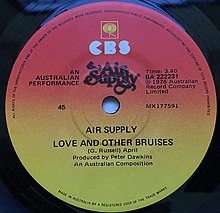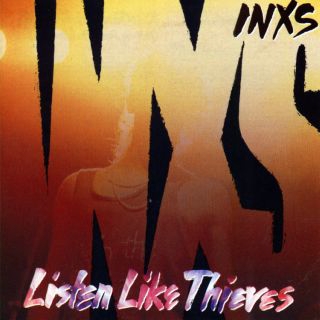
Listen Like Thieves is the fifth studio album by the Australian rock band INXS. It was released on 14 October 1985. It spent two weeks at number one on the Australian Kent Music Report Albums Chart. Considered an international breakthrough album for the band, it peaked at No. 11 on the United States Billboard 200, No. 24 on the Canadian RPM 100 Albums and top 50 in the United Kingdom.

"Love at First Feel" is a song by Australian hard rock band AC/DC. It is the second track of the international version of their album Dirty Deeds Done Dirt Cheap, released in November 1976, and was written by Angus Young, Malcolm Young, and Bon Scott. The international version was not released in the United States until April 1981.
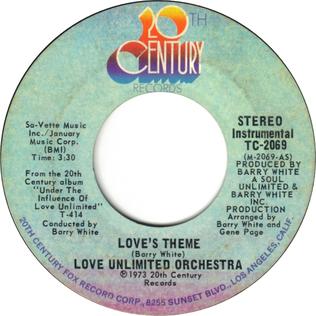
"Love's Theme" is an instrumental piece written by Barry White in around 1965, and recorded and released as a single by White's The Love Unlimited Orchestra in 1973. It is one of the few instrumental and purely orchestral singles to reach No. 1 on the Billboard Hot 100 chart in the United States, which it did in early 1974. Billboard ranked it as the No. 3 song for 1974. The piece was included on two albums: 1973's Under the Influence of... Love Unlimited and 1974's Rhapsody in White by the Love Unlimited Orchestra.
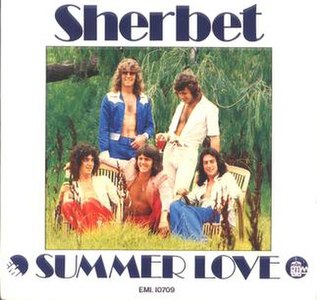
"Summer Love" is a song by Australian pop group, Sherbet and was released in March 1975. It became their first number-one hit on the Australian Kent Music Report Singles Chart. The song was promoted on the newly aired ABC TV pop series, Countdown, which gave it wide exposure. From early 1975 the group made more appearances on the show than any other band in the programme's history. In October, at the King of Pop Awards, "Summer Love" won the Most Popular Australian Single, the band won Most Popular Australian Group and their lead singer, Daryl Braithwaite, won the King of Pop award.

"Too Much Ain't Enough Love" is a song by Australian rock singer, Jimmy Barnes. It was released in October 1987 as the first single from Barnes' 1987 album, Freight Train Heart It was his first Australian No. 1 hit single, while reaching No. 4 on the New Zealand Singles Chart. In the United States it was issued in the following year, which peaked at No. 91 on the Billboard Hot 100 in July 1988. It featured back-up vocals by Venetta Fields, as well as Wendy Matthews, who later found acclaim as a solo singer.

"Now We're Getting Somewhere" is a 1986 song by rock group, Crowded House. It was the third single from the group's debut album Crowded House. It is the only single from that album to not appear on any of the band's greatest hits albums; Recurring Dream & The Very Very Best of Crowded House. It was the first single to feature the song, "Recurring Dream", as a B-Side. "Now We're Getting Somewhere" peaked at No. 63 on the Australian Kent Music Report singles chart, and No. 33 in New Zealand.

"Help Is On Its Way" is a song by Australian band Little River Band, released in April 1977 as the lead single from the group's third studio album, Diamantina Cocktail. The song peaked at number one on the Australian Kent Music Report singles chart. The song also peaked at No. 14 on the Billboard Hot 100.
"Last Romance" is a song by Australian singer songwriter Mark Holden. It was released in November 1976 as the third and final single from Holden's second studio album, Let Me Love You (1976). The song was a commercial success peaking at number 11 on the Kent Music Report.

The Whole Thing's Started is the second studio album by Australian soft rock band Air Supply, it was released in July 1977. The first single "Do What You Do" was released ahead of the album in June, "That's How the Whole Thing Started" followed in October and "Do It Again" appeared in February 1978. Neither the album nor the singles peaked into the Australian Kent Music Report Top 40 charts.

Air Supply is the debut album by Australian soft rock band Air Supply released on CBS Records in December 1976. The lead single "Love and Other Bruises" was released in October, reaching No. 6 on the Kent Music Report Singles Chart, followed by the album peak at No. 17 on the Kent Albums Chart. While the album reached gold status in Australia, the second single "Empty Pages" did not reach the Top 40 in February 1977. The album was issued as Strangers in Love in Japan.

"Just Like Fire Would" is a song by Australian alternative rock band, the Saints, which is written by the band's lead singer, Chris Bailey, and was released as a single in March 1986. It was the lead single from their seventh studio album, All Fools Day, and peaked at No. 29 on the Kent Music Report Singles Chart. It was produced by Hugh Jones, who had co-produced the album with Bailey. AllMusic's John Dougan reviewed All Fools Day and opined, "One listen to songs as grabbing as 'Celtic Ballad' or the great 'Just Like Fire Would' will convince you that despite the differences, the new Saints were a good band for completely different reasons than the old Saints."
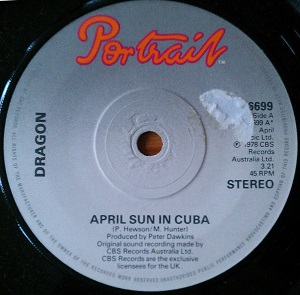
"April Sun in Cuba" is a song recorded by New Zealand group Dragon, released in October 1977. It is the first single to be released from Dragon's fourth studio album Running Free. "April Sun in Cuba" first charted on 7 November 1977, peaking at number 2 on the Kent Music Report Singles Chart and staying on the chart for 22 weeks. It also reached number 9 on the New Zealand singles chart. The b-side of the single, a non-album track called "Telephone", was credited to "Dr. Agony".

"A Touch of Paradise" is a song written by Ross Wilson, Gulliver Smith and Roger McLachlan. The song was originally recorded by Mondo Rock on their album Nuovo Mondo (1982). The song was covered by Australian singer John Farnham and American singer Kevin Paige. The song was released as the third single from his album Whispering Jack (1986). Whilst many believe that no music video was ever made for this song, while it was rarely seen one was made for its single release in late 1986.

"Don't Go" is a song by Australian pop group Pseudo Echo. The song was released in October 1985 as the lead single from their second studio album, Love an Adventure (1985). The song became the band's second top five single, reaching number 4 on the Australian Kent Music Report.

"Love an Adventure" is a song by Australian pop group Pseudo Echo. The song was released in January 1986 as the second single from their second studio album, Love an Adventure (1985). The song became the band's third Australian top ten single, peaking at number 6 on the Australian Kent Music Report.

"Current Stand" is a song by Australian pop/new wave group Kids in the Kitchen. The song was released in August 1985 as the fifth single from their debut album, Shine (1985). The song peaked at number 12 on the Australian Kent Music Report.
"C'mon Let's Do It" is a song written by Jimmy Manzie and Glenn A. Baker and recorded by Australian band Ol' 55. The song was released in January 1977 and peaked at number 24 on the Australian Kent Music Report, becoming the band's second top ten single.
"He's My Number One" is a pop song written by Terry Britten and B. A. Robertson and recorded by Australian pop singer Christie Allen. The song was released in January 1980 as the fourth single from Allen's debut studio album, Magic Rhythm (1979). The song peaked at number 4 on the Kent Music Report in Australia.
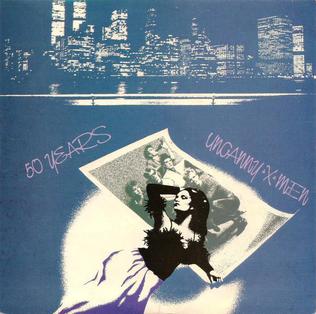
"50 Years" is a song by Australian Rock-pop group Uncanny X-Men. The song was released in May 1985 as the second single from the band's debut studio album, 'Cos Life Hurts. It peaked at number 4 on the Kent Music Report, becoming the group's first top 5 single.

"She's the One" is a song by Australian pub rock band the Cockroaches. It was released in January 1987 as the second single from the band's self-titled debut studio album. The song peaked at number seven in the Australian Kent Music Report singles chart.
